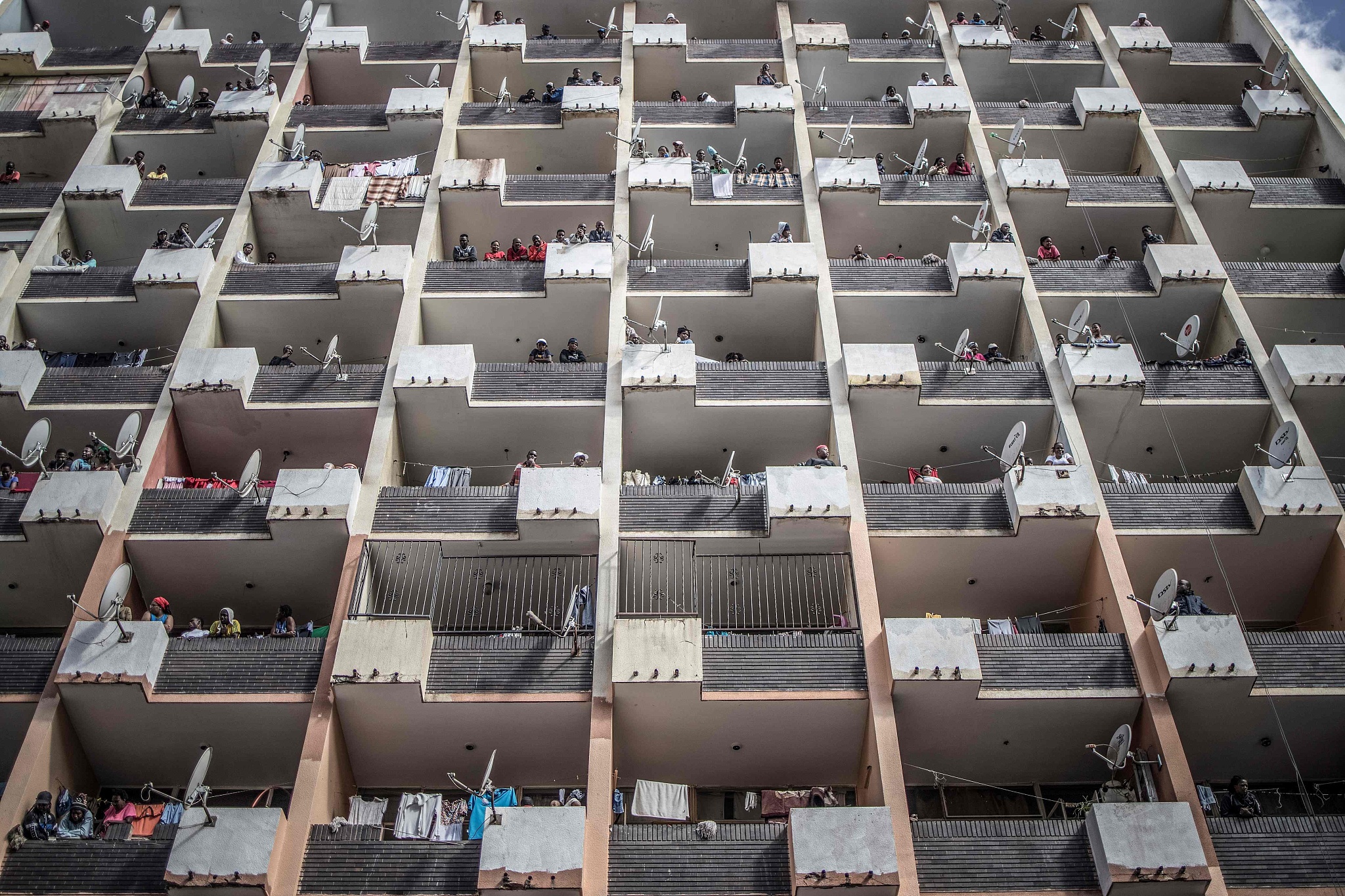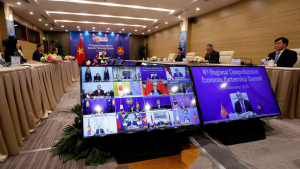Foreign news
Top 10 world news stories selected by China Media Group in 2020

Editor’s note: China Media Group, CGTN’s parent company, picked on Monday the top 10 world news stories of 2020; a gloomy, inspiring and turbulent year etched vividly in history due to the COVID-19 pandemic, the unity of the world and the regional conflicts.

- International consensus on respect for science and unity in fighting COVID-19 pandemic
The novel coronavirus became the most serious pandemic in a century. As of December 27, the COVID-19 disease has claimed more than 1.75 million lives worldwide, triggering a global crisis.
Facing a common enemy, the international community has formed a united and scientific front to fight its spread.
China promised its vaccines will be made global public good and take on the responsibility of being the world’s largest supplier of anti-epidemic materials.
- International community calls for multilateralism and strengthening global cooperation at the 75th session of UNGA
On September 21, the 75th session of the United Nations (UN) General Assembly was held via video conference. Participants urged the international community to uphold multilateralism and strengthen global cooperation.
Chinese President Xi Jinping reiterated during the conference that China will always be a practitioner of multilateralism, actively participate in the reform and construction of the global governance system, and promote the construction of a community with a shared future for mankind.
China also initiated the country’s largest humanitarian initiative and also engaged with other countries to share their experiences in fighting the epidemic.
- China is the only major economy to achieve positive growth during the coronavirus pandemic
The pandemic caused the global economy to experience its worst crisis since World War II. In March, U.S. stocks “hit the circuit breakers” four times in 10 days, and the price of international crude oil futures fell into negative territory. The stock market, bond market, foreign exchange market and commodity markets continued to fluctuate. The economies of various countries restarted slowly. The International Monetary Fund predicted that the global economy will shrink by 4.4 percent in 2020.
As the second largest economy in the world, and after suffering the impact of the pandemic, China’s economy took the lead in stabilizing and recovering, becoming the only major economy in the world that achieved positive growth this year. The Organization for Economic Cooperation and Development predicted that China will contribute more than one-third of global economic growth in 2021.
- Fifteen nations sign RCEP trade pact, the world’s biggest FTA
On November 15, the 10 ASEAN countries plus China, Australia, Japan, Republic of Korea, and New Zealand formally signed the Regional Comprehensive Economic Partnership Agreement (RCEP). The free trade zone with the largest population, the most diverse membership structure and the greatest development potential in the world was born.
At present, economic globalization is facing a counter-current, and the official signing of RCEP was deemed a victory for multilateralism and free trade. Some said it held great significance for promoting regional economic recovery and stabilizing the global economy.
- The U.S. exerts extreme pressure on Iran, as uncertainty in the Middle East increases
On January 3, the U.S. military assassinated a senior Iranian general, and continued to increase its “extreme pressure” on Iran. It also planned to extend the expired UN arms embargo on Iran, which was unanimously opposed by the international community.
2020 is the fifth anniversary of the signing of the Iran nuclear agreement. Under the extreme pressure of the U.S., the resolution of the Iran nuclear issue has seriously retrogressed.
In addition, the unrest in Syria and Libya continues. Russia and Turkey reached an agreement on a ceasefire in Idlib, Syria, but the fourth meeting of the Syrian Constitutional Committee ended in vain; the two parties to the conflict in Libya signed a “permanent” ceasefire agreement, but there is still much uncertainty.
- UN and Britain host Climate Ambition Summit 2020; China sets goal of peaking carbon dioxide emissions by 2030
To commemorate the 5th anniversary of the Paris Agreement on climate change, the UN and Britain co-hosted a climate ambition summit on December 12 through video conference.
The Paris Agreement is considered a “historic victory” for the global response to climate change. As an important contributor and active practitioner of the Paris Agreement, China announced in September this year that it will strive to reach its peak carbon dioxide emissions by 2030 and strive to achieve carbon neutrality by 2060.
- Africa free trade zone to launch by January, while African integration will usher in an important milestone
The African Continental Free Trade Area (AfCFTA) is set to begin on January 1, after the COVID-19 pandemic made its original launch date untenable, an official charged with overseeing the bloc’s establishment said on December 5.
The continental free-trade zone, once implemented, would be the largest new economic bloc since the creation of the World Trade Organization in 1994. It will bring together 1.3 billion people in a $3.4 trillion economic partnership. The African Union hopes that by 2035, the free trade zone can lift 30 million Africans out of extreme poverty and 70 million Africans out of moderate poverty.
- The killing of George Floyd, an African American man, triggers mass protests; U. S. leaves multilateral organizations
On May 25, George Floyd, an African American man, was killed by police while in custody. Protests and demonstrations triggered riots and violent clashes in many parts of the United States. The Black Lives Matter movement also expanded beyond the U.S. with protests against racism taking place in other parts of the world
Furthermore, race played a factor in this year’s U.S. elections, with political commentators stating that the two parties in the U.S. could become even more polarized.
In addition, the U.S. successively withdrew from the World Health Organization, the Open Skies Treaty, the Paris Agreement, and interfered with the selection of the Director-General of the World Trade Organization. A series of actions made it increasingly isolated in the international community.
- The ‘Year of Mars’ and China’s historic moon mission
2020 has been called the “Year of Mars.” On July 23, the Tianwen-1, which performed China’s first Mars exploration mission, was successfully launched, marking the first step in China’s autonomous planetary exploration. In July, the UAE and the United States also launched Mars probes one after the other.
In the early morning of December 17, China’s Chang’e-5 returner carried lunar samples back to Earth, marking the perfect conclusion of the three-step plan of the lunar exploration project “orbiting, landing, and returning,” laying a solid foundation for the world’s future lunar and planetary exploration.
- Conflict breaks out in the Nagorno-Karabakh region; Armenia and Azerbaijan continue hostilities
On September 27, a new round of conflict broke out between Armenia and Azerbaijan in the Nagorno-Karabakh region. On November 9, the parties concerned signed a statement announcing a complete ceasefire in the region from November 10.
According to the statement, Russia began to perform peacekeeping missions in the region, and with Turkey it signed an agreement on the establishment of a ceasefire joint monitoring center, but the two countries remain hostile. The conflict in the Nagorno-Karabakh region has caused more than 4,000 deaths, including civilians, and displaced tens of thousands of people.
Foreign news
Pakistan Moves to Deepen Diplomatic, Economic Relations With Nigeria

The Government of the Islamic Republic of Pakistan has called for deeper diplomatic and economic ties with the Nigerian government to foster development for both countries.
Mr Rana Ihsaan, the Coordinator to the Prime Minister of Pakistan made the call in an interview with the News Agency of Nigeria (NAN) during his working vist to Nigeria on Wednesday in Abuja.
NAN reports that the visiting Coordinator held a closed-door meeting with Yusuf Tuggar, the Minister of Foreign Affairs.
After the meeting, he said that both both sides had agreed on deepening relations in the areas of trade and commerce, among others.
Ihsaan said that both countries must see the need to accelerate efforts towards a Bilateral Trade Agreement (BTA).
He said that Pakistan had already submitted a draft BTA and was awaiting Nigeria’s response.
According to him, discussions centered on easing visa processes, expanding educational exchanges, and strengthening Cooperation in sectors such as Minerals, Youth training, and Defence were highlighted.
Ihsaan said that Pakistan had already implemented visa-on-arrival for Nigerians at no cost, and urged Nigeria to reciprocate to enhance people-to-people ties.
He stressed the importance of high-level engagements between both nations, describing Nigeria and Pakistan as very similar countries with large populations, youthful demographics, and vast economic potentials.
“Deeper collaboration will unlock opportunities in trade, education and investment, while further solidifying long-standing diplomatic relations,” he said.
He said that aside from visiting the foriegn Minister and other top government officials in Nigeria, he was also in the country to attend the on-going West Africa Beauty Exhibition holding in Lagos.
He described the exhibition as one of the continent’s largest cosmetic fairs, adding that he led a delegation of 19 Pakistani business people exploring Nigeria’s estimated 10 million dollar beauty and cosmetics market.
Ihsaan said that Nigeria was a gateway to Africa, adding that Pakistani products, like cosmetics, Textiles, Pharmaceuticals, Food items and Sports goods were already gaining traction in the country.
He encouraged Pakistani exhibitors to establish offices, Warehouses and logistics partnerships to strengthen their foothold in the Nigerian market.
Ihsaan further addressed concerns from Nigerian businesses on the ease of doing business in Pakistan.
He said that the Trade Development Authority of Pakistan had been supporting Nigerian participants at major exhibitions to achieve the ease of doing business.
“The Special Investment Facilitation Council (SIFC) serves as a one-stop platform for Nigerians interested in investing in Pakistan,” he said
Culled from NAN
-

 Featured6 years ago
Featured6 years agoLampard Names New Chelsea Manager
-

 Featured6 years ago
Featured6 years agoFG To Extends Lockdown In FCT, Lagos Ogun states For 7days
-

 Featured6 years ago
Featured6 years agoChildren Custody: Court Adjourns Mike Ezuruonye, Wife’s Case To April 7
-

 Featured6 years ago
Featured6 years agoNYSC Dismisses Report Of DG’s Plan To Islamize Benue Orientation Camp
-

 Featured4 years ago
Featured4 years agoTransfer Saga: How Mikel Obi Refused to compensate me After I Linked Him Worth $4m Deal In Kuwait SC – Okafor
-
Sports3 years ago
TINUBU LAMBAST DELE MOMODU
-

 News11 months ago
News11 months agoZulu to Super Eagles B team, President Tinubu is happy with you
-
Featured6 years ago
Board urges FG to establish one-stop rehabilitation centres in 6 geopolitical zones

2 Comments